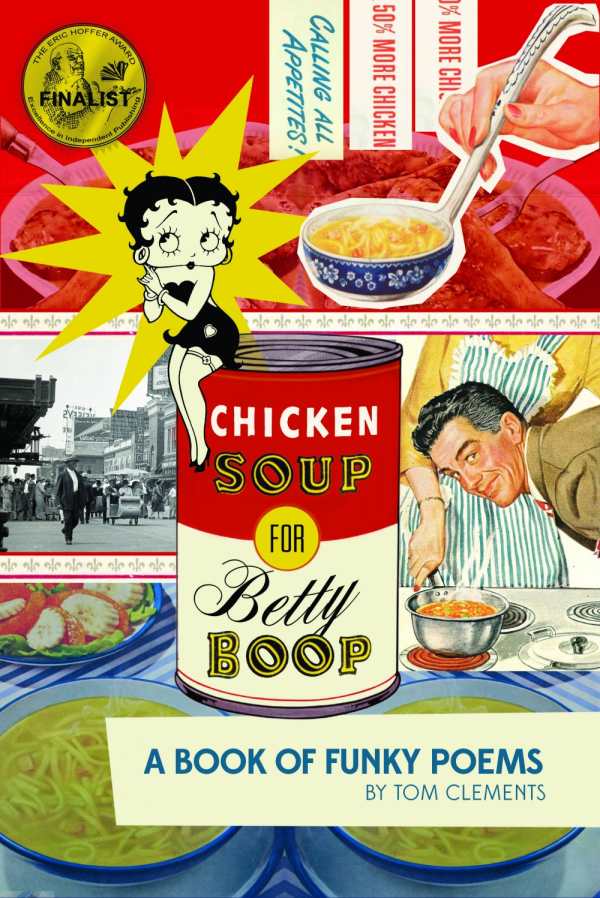Chicken Soup for Betty Boop
A Book of Funky Poems
Clements is at his best when he begins to unravel the social and moral complexities of a bygone era.
A certain cartoonish quality characterizes Tom Clements’s new collection of poems, Chicken Soup for Betty Boop: A Book of Funky Poems. It’s the kind of shtick that includes “high praise from fictitious personages” on the back cover, such as Loretta Fortunate’s pronouncement that the book offers “poetry for today, as well as for tomorrow.” Clements designed the volume to be fun. To this effect, some of the poems are light, while others sag under a surfeit of technical jargon. His best pieces are dark-edged and subversive, revealing a serious poet in the making.
Given its short length, Chicken Soup for Betty Boop is a quick read. The book comprises twenty-seven poems organized into three thematic sections: “Science,” “Religion and Philosophy,” and “Women.” Poems range in length from six lines to twenty-five lines. No poem exceeds a page. Seven of the pieces are paired with fabulous, full-page illustrations from artist Namita Kapoor: surrealistic retro collages of American consumer and pop culture. Think Betty Boop and Campbell’s Soup à la Andy Warhol. The book itself is handsomely produced, a broad, glossy, perfect-bound edition with sharp, colorful graphics.
Many of the lines utilize end rhyme, whether in an aabb scheme or something closer to abab. Although the technique creates musicality of language, it can’t compensate for some of the more tedious jargon used in the first section of book, “Science.” The expository “Neoteny,” for example, begins with “Ontogeny recapitulates phylogeny / Just a fancy way to say / A hairy zygote in a Petri Dish / Begins life as a fish.”
The first glimpse of Clements’s serious poetic voice comes in “Heat Death.” The last six lines are powerful, ringing with pathos:
Together we grow weak and old
Until at last
The present and the future
Meet the past
And then all three are one
Lukewarm, indifferent and undone.
He displays similar poetic depth in the “Religion and Philosophy” section. In “The Last Kamikaze Pilot,” he beautifully describes how the subject of the poem works himself into “a state of hollow grace.” In “Boardwalk Buddha,” Betty Boop finally makes an appearance with “bee-stung lips” and a mind like “A coney island of the kind / That Ferlinghetti sought.”
One of the best poems of the collection comes in the third and final section, “Women.” While “Broads” and “A Woman’s Place” read like glib throwbacks to male chauvinism, “Fabulosity” delves into sexism with clear eyes:
Forget she ever went down on her knees
Those men with sad expressions kept
Their hats on in the room. Even when she laughed
She wept. Instead of gloom, she called me
Fabulosity.
These lines represent the bold and searing poet Clements becomes when he digs beneath his own “funky” shtick and begins to unravel the social and moral complexities of a bygone era.
Reviewed by
Scott Neuffer
Disclosure: This article is not an endorsement, but a review. The publisher of this book provided free copies of the book and paid a small fee to have their book reviewed by a professional reviewer. Foreword Reviews and Clarion Reviews make no guarantee that the publisher will receive a positive review. Foreword Magazine, Inc. is disclosing this in accordance with the Federal Trade Commission’s 16 CFR, Part 255.

